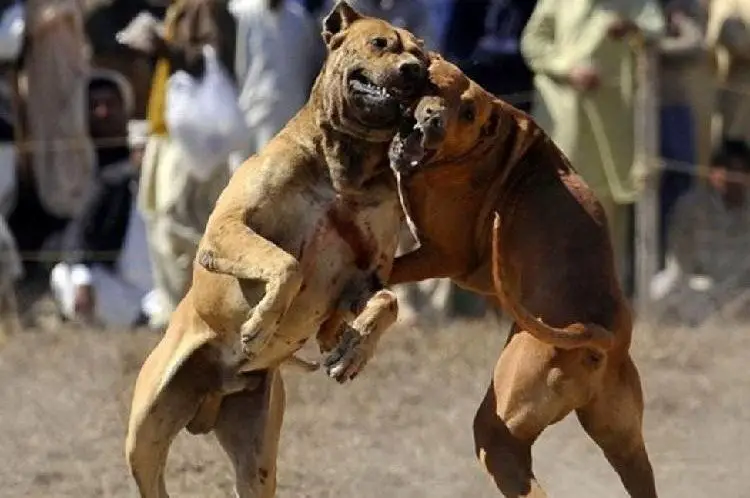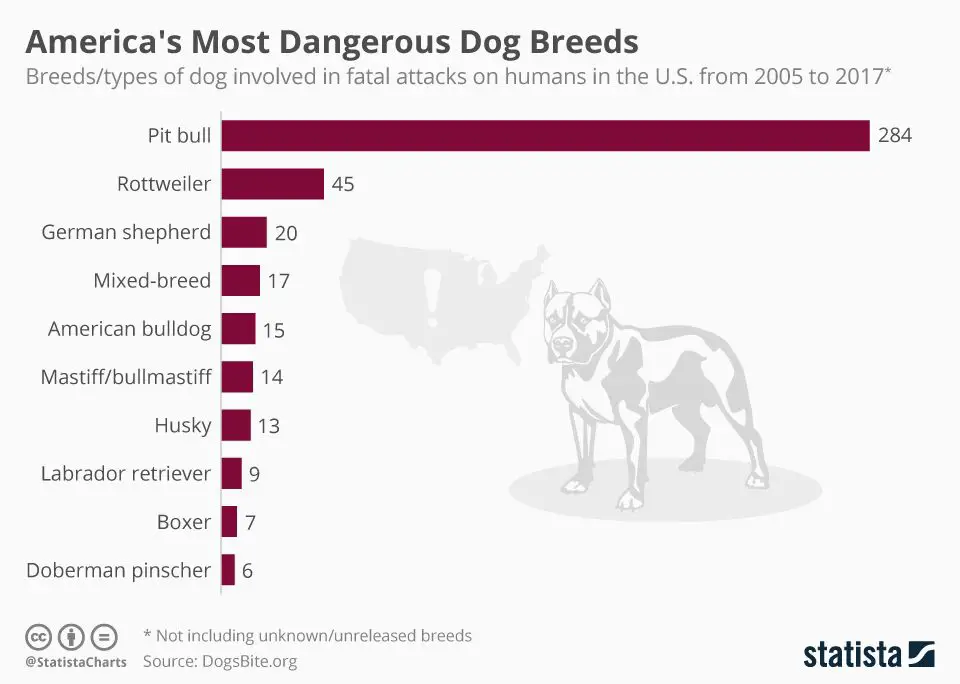What is Dog Fighting?
Dog fighting is a form of animal cruelty in which dogs are forced to fight each other for the entertainment of spectators and the financial gain of organizers. It involves training dogs to be aggressive and placing them in a pit to fight until one dog dies or is severely injured.
Dog fights usually end when one of the dogs shows signs of serious wounds, refuses to continue fighting, or dies from its injuries. Dogs used for fighting are typically raised in isolation and undergo abusive training methods to enhance aggression, such as starvation, beatings, torture, and feeding live smaller animals to them.
Dog fighting is illegal in the United States and considered a felony offense in all 50 states. It involves several crimes beyond the fight itself, such as promotion, attendance, breeding and training fighting dogs, transporting animals for fighting, and possession of fighting paraphernalia. Dog fighting is also closely associated with other criminal activity such as illegal gambling, drug trafficking, and gangs.
Is Dog Fighting Illegal?
Dog fighting is illegal in all 50 states. It is banned under federal law and in every state across the country. Most states have laws making it a felony offense, punishable by years in prison and steep fines. While dog fighting laws may have some minor differences across states, engaging in dog fights or possessing fighting dogs is a serious criminal offense everywhere in the United States.
The federal law banning dog fighting is the Animal Welfare Act of 1976. This law prohibits any interstate transport, sale, or use of dogs for fighting purposes. Being convicted under this act can result in up to 5 years in prison and a $250,000 fine.
Nearly all states have also enacted their own anti-dogfighting laws to further crack down on this activity within their borders. For example, the state of Texas categorizes dog fighting as a felony punishable by 2-10 years in prison and fines up to $10,000. Other states like Florida and Virginia make it a high-level felony with mandatory prison time and fines over $50,000.
In addition to banning actual dogfights, most states also have laws prohibiting activities that facilitate dog fighting. This includes training, breeding, selling, or possessing dogs with the intent to fight them, attending a dog fight as a spectator, or allowing property to be used for dog fighting. Simply having paraphernalia or equipment associated with dogfighting is also illegal.
The bottom line is that dog fighting is a serious crime across the entire United States, with very harsh penalties for anyone involved.

Penalties for Dog Fighting
Dog fighting is a felony offense in all 50 states. Convictions can result in hefty fines, years in prison, and seizure of assets associated with the dogfighting operation. Exact penalties vary between states but often align with the following federal guidelines:
– Attending a dogfight: Up to 1 year in prison and $50,000 in fines if it involves interstate commerce.
– Owning, possessing, selling, transporting, making, or training dogs intended for fighting: Up to 5 years in prison and $250,000 in fines.
– Organizing, sponsoring, or profiting from dog fighting activities: Up to 5 years in prison and $250,000 in fines if interstate commerce is involved. Otherwise, penalties are determined by state law.
Sentences for dog fighting convictions often increase with aggravating factors like number of dogs involved, injuries to dogs, underage spectators, gambling, and drugs/weapons offenses. For example, NFL player Michael Vick served nearly 2 years in prison for running an extensive multi-state dog fighting operation.
Beyond jail time, courts can impose a range of supplementary penalties like probation, community service, counseling, and bans on owning or living with animals. Convicted offenders may also face difficulty finding housing and employment due to their criminal record.
Factors Affecting Sentencing
There are several factors that determine how long someone may be sentenced to jail for dog fighting.
The severity of the crime is a major consideration. Cases involving more dogs or more inhumane treatment often receive harsher sentences. The frequency of fights and how long the activity has been occurring also impacts sentencing.
A defendant’s criminal history affects sentencing as well. Someone with past animal cruelty convictions will likely receive a longer sentence than a first-time offender.
The jurisdiction where the crime occurred plays a role too. Some states have stronger anti-dogfighting laws and penalties than others. Geographic location and cultural attitudes toward dogfighting may influence how it is punished.
Judges have discretion in sentencing, so the temperament and viewpoint of the presiding judge impacts the length of jail time. Sentences can range from a few months to multiple years depending on the factors involved.
Whether the defendant takes responsibility and shows remorse can mitigate sentencing. Cooperating with law enforcement and assisting in shutting down dogfighting operations may also reduce jail time.
Aggravating circumstances like gambling, drugs, weapons charges, or child endangerment can increase sentences. Overall, sentencing for dogfighting depends on a variety of factors related to the crime, defendant, and jurisdiction.
Notable Dog Fighting Cases
Several high-profile cases have brought attention to the issue of dog fighting and the legal consequences:

Michael Vick: In 2007, NFL quarterback Michael Vick plead guilty to federal felony charges related to running a dog fighting operation known as the “Bad Newz Kennels” in Virginia. Vick was sentenced to 23 months in federal prison, followed by three years of probation. He was also barred from owning dogs during probation.
Dennis Bradley: Dennis Bradley of Newark, New Jersey was arrested in 2013 for his involvement in an interstate dog fighting ring. Authorities conducted raids across 4 states and found 367 pit bulls used for fighting. Bradley pled guilty and was sentenced to 4-5 years in federal prison in 2015.
Martavious Keys: Chicago resident Martavious Keys was charged with several counts relating to dogfighting and animal cruelty in 2011. Police found at least 20 dogs with severe injuries on his property. Keys was sentenced to 4 years in prison in 2013 after pleading guilty.
Robert Hackman: Robert Hackman of Missouri ran one of the largest dog fighting operations in the country and even bred fighting dogs to sell in other states. A multi-year investigation led to a federal indictment in 2009 on multiple counts related to animal fighting ventures. Hackman was sentenced to 5 years in prison.
Rehabilitation of Fighting Dogs
When dogs are rescued from illegal fighting rings, they often require extensive rehabilitation before they can be adopted into homes. These dogs have frequently been trained to be aggressive and may lack socialization. Rehabilitating a fighting dog requires patience, skill and time.
The first step is to place the dogs in a shelter where they can be safely housed separately while their behavioral and medical evaluations are conducted. Fighting dogs tend to be undersocialized with humans and animals, so introducing them to new sights, sounds and smells gradually is important.

Positive reinforcement training is essential for building trust and teaching non-aggressive behaviors. Fighting dogs will need socialization classes to learn how to interact with both animals and people. Professional training helps the dogs become well-adjusted. Some may eventually pass behavioral tests qualifying them for adoption.
However, not all fighting dogs can be rehabilitated well enough to be adopted. Those unable to overcome aggressive behaviors may live out their lives at animal sanctuaries where they can safely continue their rehabilitation. With time, care and training, many fighting dogs can successfully transition into family life after being rescued from the trauma of dog fighting rings.
Prevention of Dog Fighting
There are various efforts focused on preventing and reducing dog fighting through education and outreach. Public awareness campaigns aim to teach people about the inherent cruelty involved in dog fighting and its impacts. Schools, community centers, and youth programs often provide humane education stressing compassion and positive treatment of animals. Other initiatives work to promote spay/neuter, pet adoption, licensing and microchipping to reduce stray dog populations and make it more difficult for fighting operations to obtain dogs. Law enforcement and animal control agencies try to identify and monitor individuals involved in dog fighting to stop events before they occur. Visits to schools and neighborhoods help reinforce anti-dogfighting messages and build relationships. Some jurisdictions also have hotlines to report suspected dog fighting activities anonymously.
Furthermore, nonprofit organizations carry out projects providing alternatives to dog fighting for at-risk youth, such as dog training programs teaching humane methods. Public messaging campaigns feature former dog fighters speaking out against the practice. Outreach through social media platforms also aims to change attitudes in key demographics. While deeply entrenched in certain areas, dog fighting can be reduced through persistent education and effort. But it requires mobilizing public opinion against the inherent cruelty, challenging notions that dog fighting is acceptable, and offering youth alternative paths and activities.
Statistics on Dog Fighting
According to the ASPCA, dog fighting is estimated to generate about $500 million in illegal gambling profits each year in the United States. However, it’s difficult to track exact statistics on dog fighting due to the underground nature of the activity.

In 2019, there were 985 dogfighting cases reported across the United States, according to the National Link Coalition. This was a significant increase from 2017 which saw 609 cases. The rise in cases could be due to increased crackdowns from law enforcement and anti-dog fighting organizations. The states with the highest numbers of dogfighting cases in recent years include Texas, Alabama, Mississippi, Louisiana, and South Carolina.
The ASPCA estimates that there are at least 40,000 professional dogfighters in the country, in addition to many street fighters. Additionally, they estimate 250,000 dogs are kept for fighting purposes in the United States.
Law enforcement face challenges in investigating and prosecuting dog fighting operations due to their secrecy. Significant resources in conjunction with search warrants are often needed to gather enough evidence for convictions and shutdown fighting rings.
Consequences Beyond Jail Time
Dog fighting convictions can impact a person’s life even beyond the potential of serving jail time. Here are some other possible consequences of being convicted for dog fighting:
Loss of future employment opportunities – A felony conviction for dog fighting will show up on background checks and can prevent people from getting many jobs, especially those working with animals.
Fines and restitution – Those convicted of dog fighting may face fines up to $250,000 and have to pay for the care and rehabilitation of seized animals, which can easily run into the tens of thousands of dollars.
Asset forfeiture – Property such as the land where fights were held, vehicles used to transport dogs, and money connected to gambling on fights may be seized.
Loss of rights – Convicted felons often lose rights such as voting, serving on a jury, and owning firearms. Dog fighters may not be able to own pets again.
Reputation damage – Dog fighting convictions publicly label people as criminals involved in a widely reviled blood sport. This can ruin personal relationships and social standing.
Breed ban – Those involved with fighting pit bulls may be prohibited from owning this specific breed going forward.
Psychological impact – The shame and social isolation resulting from a dog fighting conviction can lead to mental health issues.
Overall, a felony conviction for dog fighting can permanently strip away freedoms and opportunities in addition to jail time. The consequences can follow people for the rest of their lives and impact future generations as well.
Conclusion
In summary, dog fighting is a cruel and inhumane practice that is illegal in all 50 states. It is considered a felony offense, with penalties that often include both jail time and significant fines. Sentencing guidelines vary by state, but previous cases have resulted in years-long jail sentences. Even for first-time offenders, some amount of jail time is likely.
Beyond jail, those convicted of dog fighting may face other consequences. Their dogs will likely be confiscated and they may be banned from future dog ownership. They can also face heavy fines in the thousands or tens of thousands of dollars. There is a possibility of federal charges if dogs have crossed state lines for fighting purposes. Dog fighting is not taken lightly by authorities and has serious legal punishments associated with it.
To answer the main question directly: Yes, you can absolutely go to jail for dog fighting. The practice is a felony in all states and often results in multi-year sentences for those convicted.